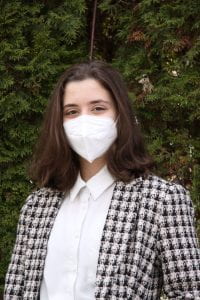Blog Post #4
Progress Report
Over the last two weeks, I have had the chance to work on the quality of my photos. It first started with looking over the photos I took during the last session. If you looked at my last post, I was working on shutter speed. I represented a fast shutter speed by dropping items into a glass of water, and I made shapes and drawings with lights to represent a slow shutter speed. Leading up to the first session of these two weeks, I redid the same type of shoot, but with improvements from the last one.
Instead of using a thick glass that doesn’t curve outward, I used a wine glass and I used a tripod instead of just using my hands. this made it so that I was able to get straighter photos and keep the focus. Lastly, for the light painting, I put a still object in the middle of the moving light. This made the photo a bit more interesting.
The second week I had to take portraits when asking the subject questions to get more natural poses. I took two sessions with a different person each time. Below are a few of my favourite shots from the first shoot.
In this shoot, I found that I could not get the eyes perfectly in focus, which isn’t that big of a deal, but it’s what you aim for when taking portraits. I then used this critique to help me with the second shoot.
In this shoot, I was able to make the eyes more in focus, which really helped with the quality. I think by doing two shoots I was able to grow and learn from my mistakes.
How to have a beautiful mind
During these two weeks, we worked on “How to listen” and “How to generate questions”.
Discuss any new points of view you developed while in conversation with your mentor.
In the first meeting, we were talking about the photos I took from the previous week and how I could improve them. When discussing my photos, he would tell me “All the elements are there, but sometimes it just doesn’t work out.” I found that quote has really stuck with me when taking my photos and has opened my horizons. It tells me that when taking a photoshoot, I could take like fifty photos and only one could be a good one. What I am saying is that this has really given me a new point of view and has made me a better photographer.
How do your mentor values differ from yours?
My values as someone learning photography are to become better at this craft and to grow with a skill. However, I think that my mentor’s values would be to give someone the basic skills to an art that could grow into multiple things. For example, I could use this skill and become a teacher of this skill like him or I could become a full-time photographer. The possibilities are endless
What question did you ask to check on facts and details? Elaborate.
During the first meeting, he said that we were going to work on aperture next, but then I clarified, by asking “I thought we already did aperture. Should we be working on ISO?” He then let me know that he made a mistake, and I was correct. If I had not clarified, then I would be still working on aperture.
My questions and why did I ask these?
During my second meeting I asked, “How do you think I can improve my portraits?” and he answered with “Where you focused the camera. When taking Portraits, you usually want to focus the camera on the eyes of the subject.” I asked this question because that way I can grow and overall improve my portraits. He also gave me an 85mm lens after, which is considered a portrait lens. He told me it would help with the quality of my portraits, by also making the background blurry compared to what I had.
I just want to thank my mentor Mr. Ross for helping me grow from my mistakes and get better at photography. Come back in two weeks to see me grow and continue on my journey! Bye!! 😊




Leave a Reply